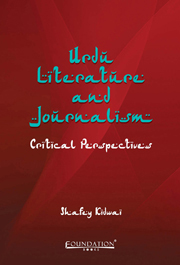Book contents
- Frontmatter
- Dedication
- Contents
- Preface
- Introduction
- Acknowledgements
- 1 Post-Independence Urdu Short Story
- 2 Post-Partition Urdu Poetry
- 3 Structuralism and Post-structuralism in Urdu Criticism
- 4 Jayant Parmar
- 5 Firaq as a Critic
- 6 Ghalib Criticism
- 7 Literature, Culture and Social Consciousness
- 8 The Influence of Tagore on Urdu Literature
- 9 Early Journalistic Endeavours of Sir Syed Ahmad Khan
- 10 Pioneering the First Urdu Book on Journalism
- 11 The Contribution of Urdu Journalists to the First War of Independence
- 12 Abul Kalam Azad's Journalistic Conquests
- Index
3 - Structuralism and Post-structuralism in Urdu Criticism
Published online by Cambridge University Press: 05 October 2014
- Frontmatter
- Dedication
- Contents
- Preface
- Introduction
- Acknowledgements
- 1 Post-Independence Urdu Short Story
- 2 Post-Partition Urdu Poetry
- 3 Structuralism and Post-structuralism in Urdu Criticism
- 4 Jayant Parmar
- 5 Firaq as a Critic
- 6 Ghalib Criticism
- 7 Literature, Culture and Social Consciousness
- 8 The Influence of Tagore on Urdu Literature
- 9 Early Journalistic Endeavours of Sir Syed Ahmad Khan
- 10 Pioneering the First Urdu Book on Journalism
- 11 The Contribution of Urdu Journalists to the First War of Independence
- 12 Abul Kalam Azad's Journalistic Conquests
- Index
Summary
The epistemological and theoretical aspects of literary theories have caused them to draw too much unnecessary attention towards themselves, especially with the publication of Khawaja Altaf Husain Hali's prodigious monograph, ‘Muqadma-e-Sher-o-Shaeri’ (Preface to the Debate on the Nature of Poetry) in 1893. The Preface is the first book in Urdu that goes beyond the unconditional glorification of poetry and actually tries to probe into what ails contemporary Urdu poetry. Hali, an accomplished poet, biographer, scholar and disciple of Mirza Asadullah Khan Ghalib, tried to turn attention to the theoretical and aesthetic stand point of evaluating literature objectively.
In ‘Muqadma-e Sher-O-Shaeri’, Hali persistently puts together well established eastern and western canons for the appraisal of poetry. How does literature reflect external reality through language and rhetorical devices? What is the sort of relationship that exists between literature and individual and collective consciousness? How does poetry communicate with the reader? How does the poet along with the reader and the text, collectively give life to a piece of literature? Do social conditions leave an indelible mark on literature?
These sorts of pertinent questions are assiduously discussed in the ‘Muqadma’ and Hali also delineates the distinctive features of various genres of poetry. Hali firmly believes in the mimetic representation of the external world through literature and his intent on simplicity, spontaneity and true depiction of reality, enabled Urdu criticism to release itself from the bond of opinion-centred assessment.
- Type
- Chapter
- Information
- Urdu Literature and JournalismCritical Perspectives, pp. 65 - 76Publisher: Foundation BooksPrint publication year: 2014

